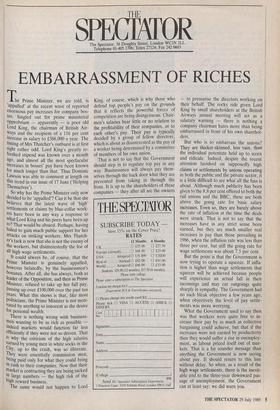The Spectator, 56 Doughty Street, London WC1N 2LL Telephone 01-405
1706; Telex 27124; Fax 242 0603
EMBARRASSMENT OF RICHES
he Prime Minister, we are told, is 'appalled' at the recent wave of reported enormous pay increases for company bos- ses. Singled out for prime ministerial opprobrium — apparently — is poor old Lord King, the chairman of British Air- ways and the recipient of a 116 per cent increase in salary to £386,000 a year. The timing of Mrs Thatcher's outburst is at first Sight rather odd. Lord King's greatly re- freshed stipend was known over a month ago, and almost all the most spectacular increases in bosseS' pay have been known for much longer than that. Thus Dominic Lawson was able to comment at length on this trend in our issue of 17 June ('Helping Themselves).
So why has the Prime Minister only now decided to be 'appalled'? Can it be that she believes that the latest wave of 'high' settlements or claims by blue-collar work- ers have been in any way a response to What Lord King and his peers have been up to? That would be absurd. Perhaps, having failed to gain much public support for her attacks on striking workers, Mrs Thatch- er's tack is now that she is not the enemy of the workers, but disinterestedly the foe of all high wage settlements.
It could always be, of course, that the Prime Minister is genuinely appalled, however belatedly, by the businessmen's bonanza. After all, she has always, both as leader of the Opposition, and then as Prime Minister, refused to take up her full pay, Passing up over £100,000 over the past ten Years. What this shows is that, like most Politicians, the Prime Minister is not moti- vated by anything so innocent as the desire for personal wealth.
There is nothing wrong with business- men wanting to be as rich as possible — indeed markets would function far less efficiently if they were not so driven. That is why the criticism of the high salaries earned by young men in white socks in the City, up to the crash, was so illiterate. They were essentially commission men, being paid only for what they could bring in cash to their companies. Now that their market is contracting they are being sacked in large numbers — the high risk of the high reward business.
The same would not happen to Lord King, of course, which is why those who defend top people's pay on the grounds that it reflects the powerful forces of competition are being disingenuous. Chair- men's salaries bear little or no relation to the profitability of their companies, or to each other's pay. Their pay is typically decided by a group of fellow directors, which is about as disinterested as the pay of a worker being determined by a committee of members of his own union. That is not to say that the Government should step in to regulate top pay in any way. Businessmen will always pay them- selves through the back door what they are prevented from taking in through the front. It is up to the shareholders of these companies — they after all are the owners — to pressurise the directors working on their behalf. The rocky ride given Lord King by small shareholders at the British Airways annual meeting will act as a salutary warning — there is nothing a company chairman hates more than being embarrassed in front of his own sharehol- ders.
But who is to embarrass the unions? They are thicker-skinned, less vain, than the individual potentate held up to scorn and ridicule. Indeed, despite the recent attention lavished on supposedly high claims or settlements by unions operating in both the public and the private sector, it is a little difficult to see what all the fuss is about. Although much publicity has been given to the 8.8 per cent offered to both the rail unions and the BBC, these are both above the going rate for basic salary increases. Even so, they are barely above the rate of inflation at the time the deals were struck. That is not to say that the increases have in any strict sense been earned, but they are much smaller real increases in pay than those prevailing in 1986, when the inflation rate was less than three per cent, but still the going rate for wage settlements was about 7.5 per cent.
But the point is that the Government is now trying to operate a squeeze. If infla- tion is higher than wage settlements that squeeze will be achieved because people will experience an actual fall in their incomings and may cut outgoings quite sharply in sympathy. The Government had no such bleak objective a few years ago, when objectively the level of pay settle- ments was more worrying.
What the Government used to say then was that workers were quite free to in- crease their pay by as much as collective bargaining could achieve, but that if the increases were not earned by productivity then they would suffer a rise in unemploy- ment, as labour priced itself out of mar- kets. That is a far sounder message than anything the Government is now saying about pay. It should return to this line without delay. So when, as a result of the high wage settlements, there is the inevit- able end to the three-year downward pas- sage of unemployment, the Government can at least say: we did warn you.


















































 Previous page
Previous page